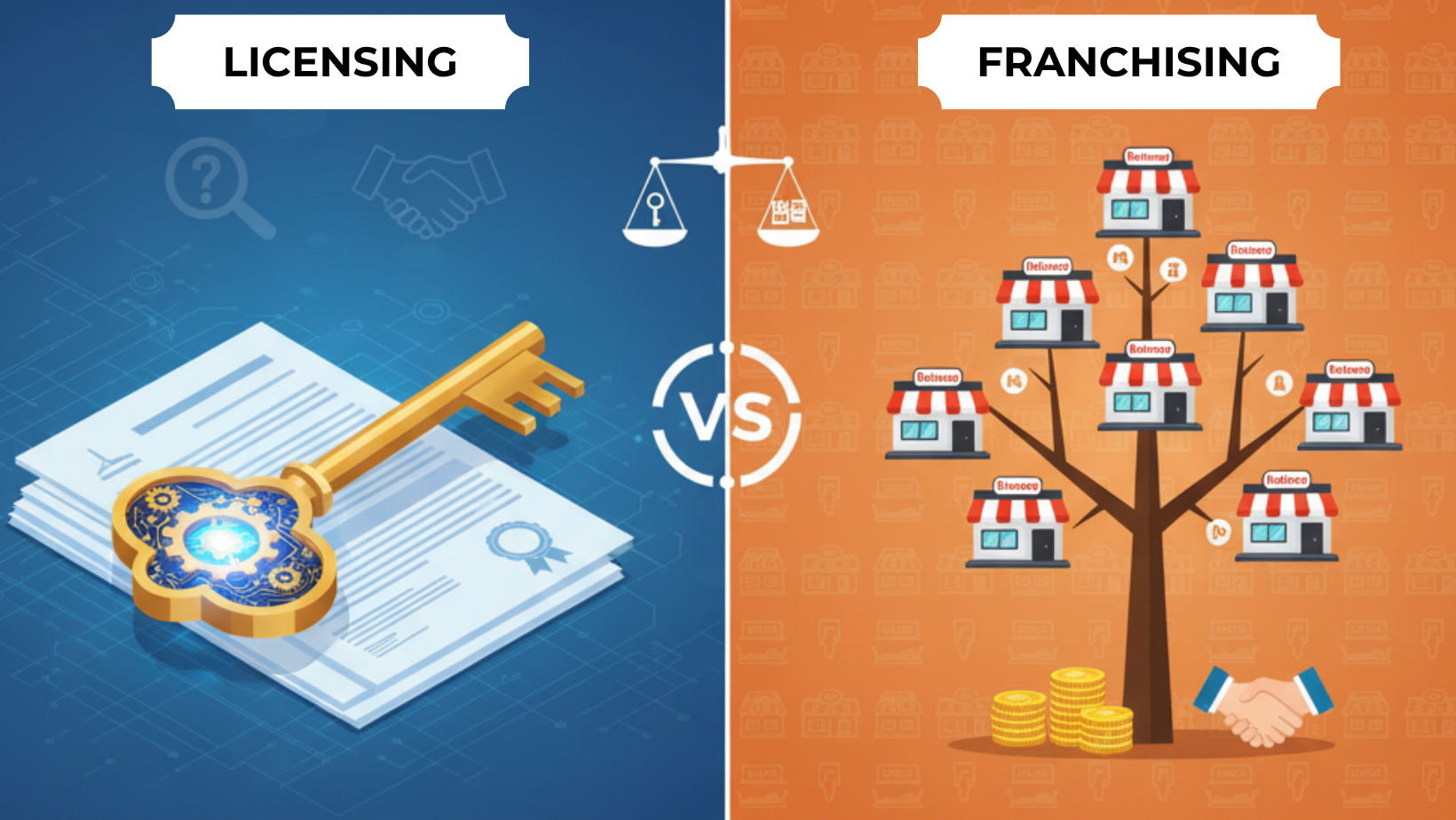Ready to Embark on an Exciting Journey with WIN?
Take the first step toward personal and financial freedom by filling out the interest form. One of our franchise advocates will be in touch with you soon!

Are you looking to start a new business and have the capital to get started?
There are many business models and structures to consider, including licensing and franchising opportunities.
This guide will help you explore these two options. Both offer advantages. However, you’ll want to find the best business move for you. To do so, compare the key features, benefits, and potential drawbacks of each.
The primary difference between licensing and franchising lies in the initial agreement and the benefits that accompany your initial investment. This agreement determines the entire business model. Each option comes with varying levels of control, legal regulation, and business goals. You should also consider how much support you’d like when starting your newest venture.
Franchisors provide training, marketing, technology, and ongoing operational support to their franchisees. In contrast, licensors rarely offer extensive support; licensees are left to manage their own business operations.
Here is a quick comparison.
Licensing is a business agreement that allows for the shared use of an intellectual property asset, such as a trademark or the use of specific technology.
For example, Disney licenses its brand and characters to toy manufacturers. Toys are created and sold based on Disney’s intellectual property. Disney is then paid a royalty. Like when LEGO partnered with Disney for its 100th anniversary. Similarly, McDonald’s releases Disney-inspired toys in its Happy Meals.
In comparison to franchise agreements, licensing is more limited. You can expect less control and support. Within this business agreement, you don’t receive training, marketing, or ongoing operational support. You will also not tap into any business-specific technology.
Now for franchising. This option involves a business agreement that includes the licensing of a trademark, transferring control of how the underlying franchised business is operated. When you buy a franchise, you duplicate a brand, a pre-built business model, and its ongoing operation. You essentially purchase the rights to operate your chosen business, using its name, logo, trademarks, and other associated elements. You also gain access to the company’s technology.
Taking the example back to McDonald’s, while it seeks licensing agreements from brands like Disney, McDonald’s itself is a franchise. Independent business owners, known as franchisees, purchase a proven system and an established brand. A recipe for success is handed over, including operational standards, marketing tactics, and comprehensive support.
Considering McDonald’s earns around $4 million a year in its franchise earnings, it’s no small investment to get involved. You need at least $1 million to take that leap.
When examining examples like McDonald’s and the associated costs of franchise opportunities, it’s easy to see why many business owners focus on specialized niches that align with their interests.
Take WIN, the #1-ranked home inspection franchise in the United States, for example. This high-margin business journey can begin for less than $50,000, with some of WIN’s partners, such as Dave, achieving over $600,000 in revenue after just two years.

Here is a comparison of licence vs franchise opportunities, focusing on the core advantages and disadvantages.
PROS
CONS
PROS
CONS

If you’re ready to make your next investment, consider your current circumstances and needs.
There are many considerations, so review the pros and cons. But for the most part, franchising is better if you seek a consistent, branded business model. It is a turn-key solution that can help ensure a quick, profitable return on your investment, as long as you manage the business accordingly.
Licensing is better if you want more control and have less to invest. However, without proven systems, marketing, and ongoing support, the path to profitability becomes significantly more challenging.
Considering company-owned stores vs franchise opportunities? Looking into a license agreement vs franchise agreement? Now is the time to sit down and focus on the key differences between licensing vs franchising, including scope, support, control, cost, and potential return on investment.
If you decide a franchise opportunity is right for you, explore our affordable options and schedule a free consultation with WIN.
Also, dive deeper into these resources: